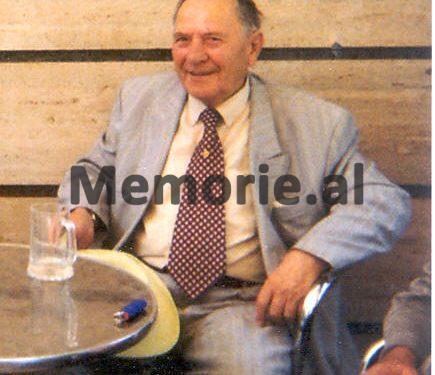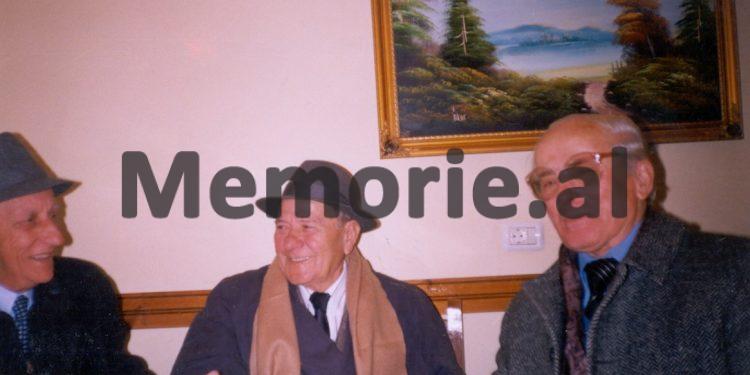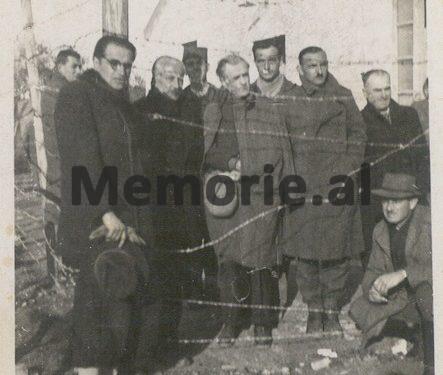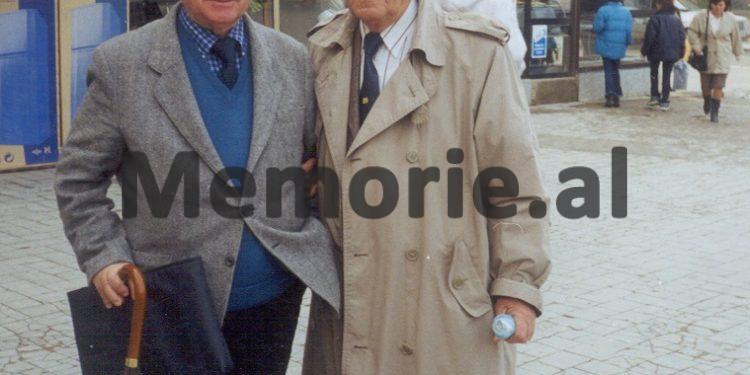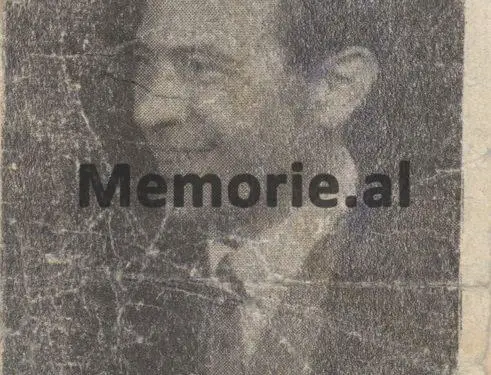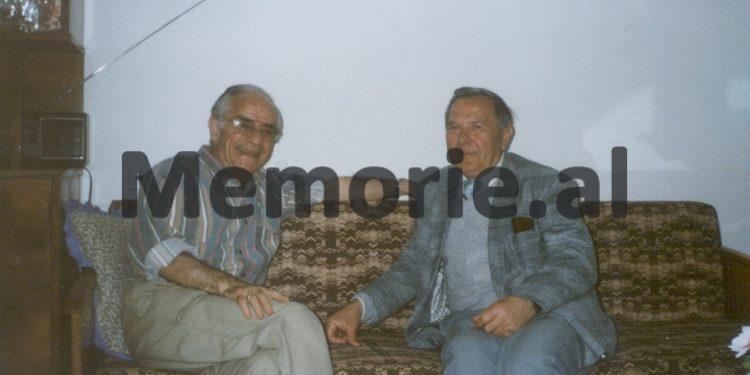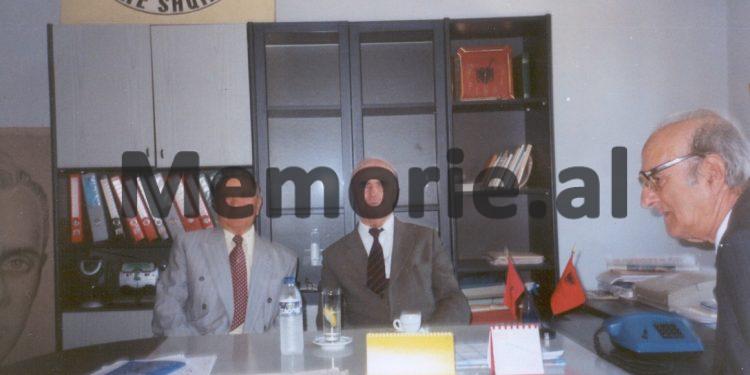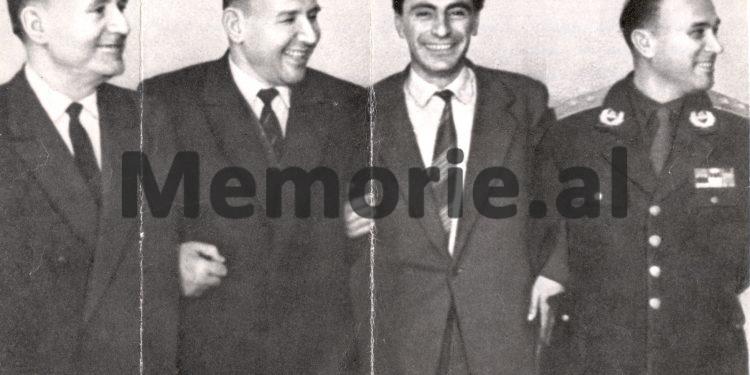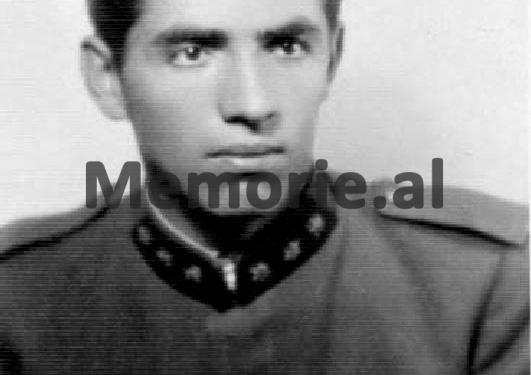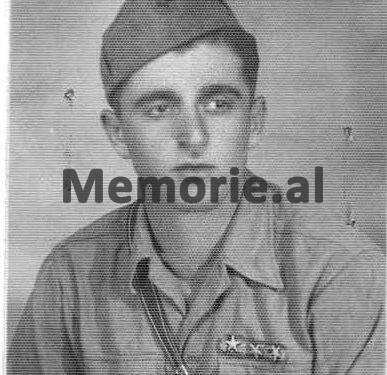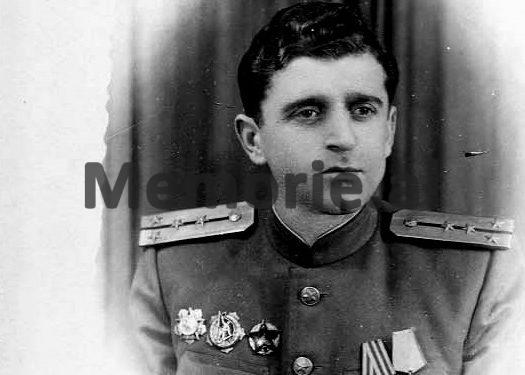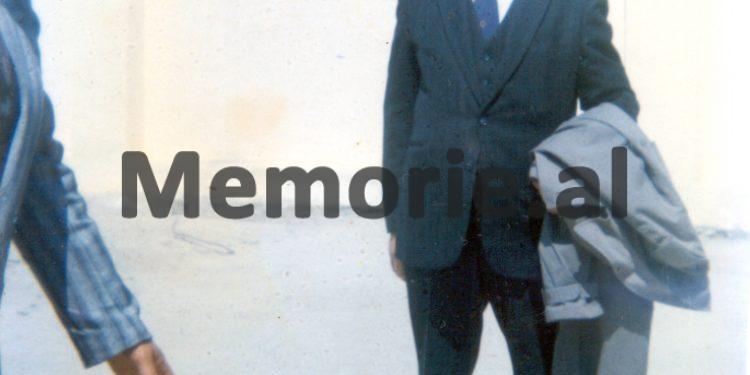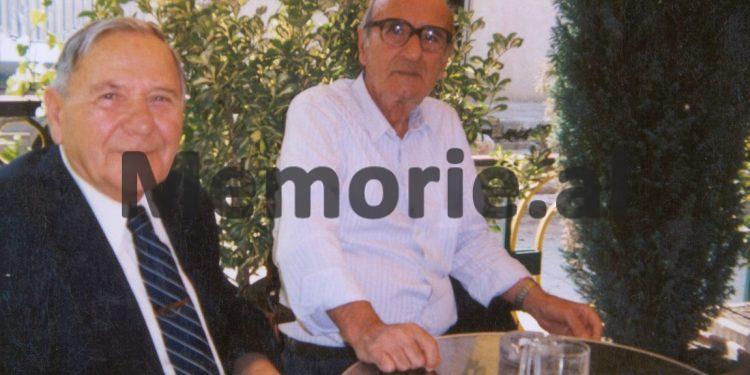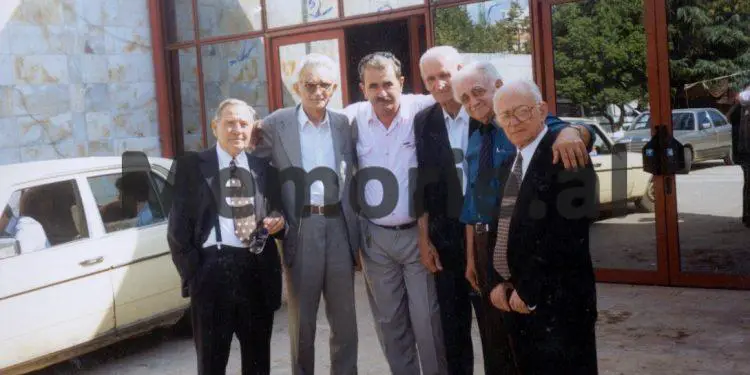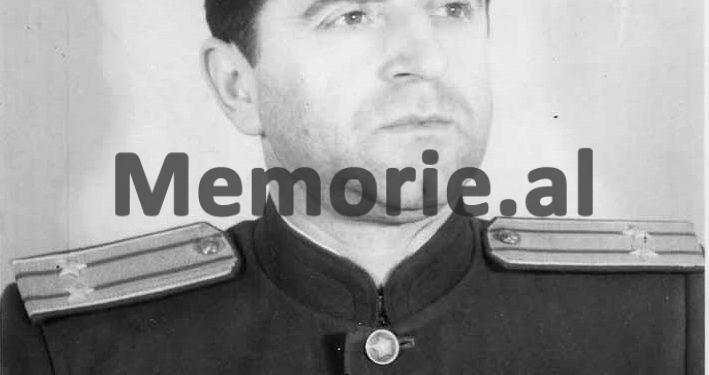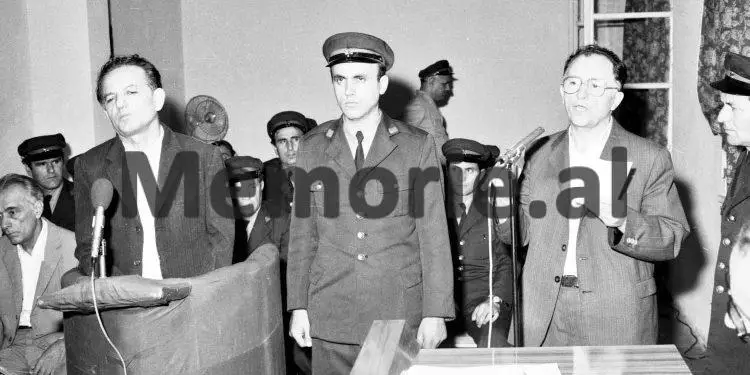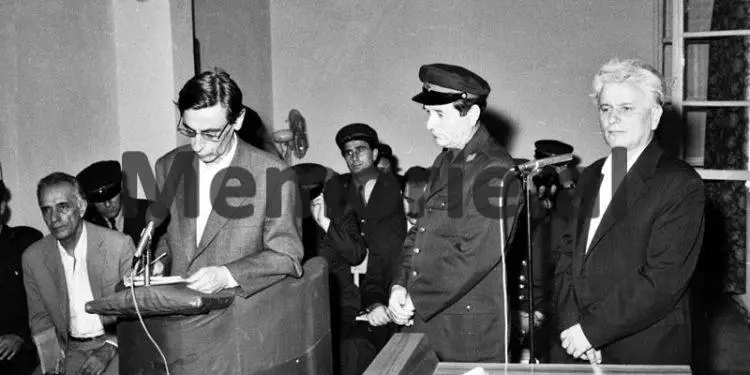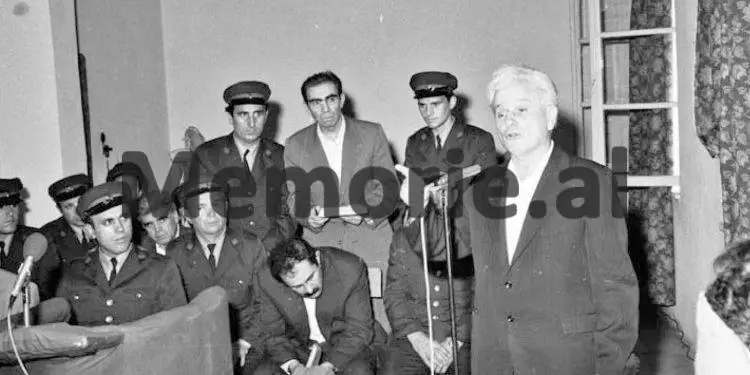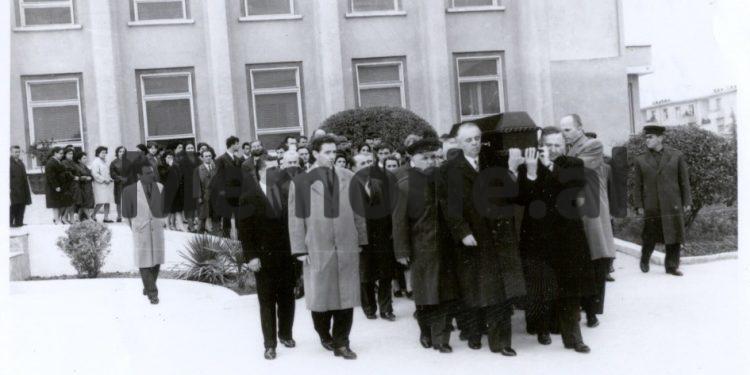Dashnor Kaloçi
Memorie.al publishes the unknown story of Ahmet Beqo Nivica, originally from the village of Kurvelesh, from where he inherited the surname, who after being educated in the Vlora Commercial, during the Anti-Fascist War was the commander of the Balli Kombëtar Youth Squads in the Region of Gjirokastra and at the end of 1944, he was able to leave Albania with some of the main exponents of the nationalist organizations of the National Front and Legality, such as Mit’hat Frashëri, Hasan Dosti, Abaz Kupi, etc., settling in Italy in camps of political asylum seekers who had opened up Anglo-Americans at the time.
Ahmeti’s departure from Italy to France together with Sadik Premten, as he was in danger of being arrested and appearing in court, accused of killing several Italian captives in Selenica, Vlora in 1943 and settling in Paris where he studied. higher graduating in Chemical-Industrial. Ahmeti’s friendship with some of the Albanian political emigrants who were in France at that time and also his closeness and very close friendship with Llambi Peçini, who was acting as an Albanian Intelligence officer, at the Albanian embassy in Paris, disguised as a diplomat.
The repatriation of Ahmet Nivica in 1958 in Albania after an amnesty granted by the then communist regime and his appointment as head of a Commercial Enterprise in the city of Elbasan, where then the Minister of Internal Affairs Kadri Hazbiu, together with the President of The Internal Affairs Branch, Shim Kolli, called him and asked him to cooperate with the State Security organs, approaching some people who intended to flee abroad and would seek his help. Ahmeti’s refusal to work for the Security and his arrest in 1960, being sentenced to many years in prison, which he suffered in the Spaç camp from where in 1983 he was taken and brought to “Ward 313” in Tirana, asking him to testify against Kadri Hazbi and Llambi Peçini
In the premises of prison 313 in Tirana, at that time there were also cells where Kadri Hazbiu, Feçorr Shehu, Llambi Peçini, Llambi Ziçishti, Nesti Nase, and some others who were considered as their collaborators were kept isolated under strict security measures. As they were taking me to the special investigation which was a real hell of iron doors opening and closing with a frightening noise, climbing the stairs, we were confronted by an officer and a civilian who were coming down. As soon as we approached one-meter distance with the two of them, the officers accompanying me stopped me and turned me on my back, so that we would not look at each other. “But I recognized very well the man who was the former chief investigator of the Republic, Nevzat Haznedari.” The man who speaks and testifies for Memorie.al, is Ahmet Nivica, former commander of the Youth Front National Squads during the War years and then a political emigrant in Italy and France until 1958, who recounts his entire adventure with senior State Security cadres asking him to testify against former Security Director for senior leadership Llambi Peçini and Interior Minister Kadri Hazbiu.
Who is Ahmet Nivica and what activity did he carry out during the years 1949-1958 when he was a political emigrant in France? What did the secret services of some western countries ask of him and why did they make it his primary task to recruit the first secretary of the Albanian embassy in Paris, who then returned to Tirana and for many years held high positions in the Security of State? What were they talking about in the Paris cabaret until late at night, the Albanian political emigrant, with his compatriot, who was actually acting as Chief of Security, but camouflaged under the guise of a diplomat? What did they ask of each other and why did Ahmet Nivica persuade to return to Albania in 1958? Who received him at the Rinas airport, what statement did he give to the journalist Petrit Mullisi and who were the people who first visited him in the hotels “Volga” and “Dajti”?! Where did Ahmet Nivica settle down and what were his relations with Llambi Peçini, the former diplomat of the Albanian embassy in Paris, who after returning to Tirana, became the right wing of Mehmet Shehu and Kadri Hazbiu? What did Kadri Hazbiu and Shim Kolli ask Ahmeti in 1963 and why did he refuse to serve them?
Mr. Ahmet, where were you at the time when you were asked to testify against Kadri Hazbi and Llambi Peçin?
At the beginning of 1983, when I was asked to testify against Kadri Hazbi and Llambi Peçini, I was in the Spaç camp, where I was serving a ten-year sentence as a political prisoner, which was given to me in 1981. At that time, I was in that camp, I did not work, because I was old.
Who were the convicts you associated with and with whom did you have the closest friendship?
At that time, I was associated with many convicts, but the closest friends I had were: Luan Myftiu, Musa Maçi, Lavdosh Beqo, etc. Whereas a few years ago, in 1977, when I was serving my second sentence, I had close friendships with Osman Kazazi, Dilaver Radesh, Qani Çollaku, Vangjel Lezhon, etc.
Who called you to the Spaç camp and what did they tell you?
At the end of January or the beginning of February 1983, I was called to the command of the Spaç camp and after getting in the bus, I was sent to Tirana. No one told me why they were taking me from that camp and where they were taking me, as that was the practice of the prisons of that time. There were two other convicts in that car with me that I did not know at all. When we came to Tirana, they took me to “Ward 313” (Old Prison) and there they left me in a cage together with many other convicts.
Who do you remember from the convicts who were in the barracks of “Ward 313” in Tirana at that time and which convicts did you associate with?
In the cage of 313 I found many convicts I knew, but the man I accompanied most was Adem Skëndo from Salaria, who died in prison in 1984. Ademi had been one of the leaders of the Zhapokika Anti-Communist Movement in the district of Tepelena in the 50s. I had friendships and also associated with Agim Bylyku, Dr.’s brother. Bedri Bylykut. At that time, in that coffin, was also Christopher Martyr, the former Chief Investigator of the Republic, who, as I later learned, had been summoned for the same purpose that they had summoned me.
When did you learn the reason why you were brought to the cafe in Tirana?
I learned the real reason only after a month of staying there. All that time I could not even imagine why I had been brought to the barn. As I said, about a month later, two police officers came and took me from the coffin and took me to the other side of the prison building, where the Special Investigation was located. There I was picked up by a new officer, and by the time I was in the reception office, she was filled with many officers and police who began to question me all in turn.
What were you asked about?
They wanted to know how much I was convicted, why I was convicted, where I was from, and so on. All those questions they asked out of curiosity and I answered quite normally.
But then where did they take you?
After being held at the reception desk for some time, two police officers picked me up and escorted me to the Special Investigation Unit. As we were climbing the stairs, we were confronted by an officer and a civilian who were coming down. As soon as we approached one-meter distance with the two of them, the officers accompanying me stopped me and turned me on my back so that we would not look at each other. But I recognized very well that man, who was the former Chief Investigator of the Republic, General, Nevzat Haznedari. I was then escorted to the guard’s office where an officer was, who invited me to approach the stove and handed me a cigarette. But I hesitated to take it and he laughed saying to me, “I know because you are reluctant to take our cigarettes, but take it that I do not have it maliciously.” Then I took the cigarette and he asked me where I was from and how much I had been convicted of. When I told him ten years, he shook his head in regret. But as if not to be pitied by him, I said, “It does not matter.” And he replied, “No, it is not so.” Meanwhile, without finishing his speech, the door opened and another officer grabbed me by the arm and dragged me out of the office. At the time he was putting me in a cell, in the hallway I saw three women coming in a row one after the other.
Who were they?
It seems to me that one of them was Jorgjia Premtja, the wife of the former Director of Security of the leadership, Llambi Peçini, who was isolated in those cells of that prison where we were also. The other, was Nesti Nase’s wife. At least that’s how it seemed to me.
What happened next to you, where did they take you?
The police officer who took me by the arms from the guard officer’s office forcibly put me in a cell and locked the door. I was in a very difficult situation, as I still did not know why I had been taken from Spaçi and brought to the cafe in Tirana. The cell where they put me was one, one meter and twenty, and lined with planks. It had only one barred window at a very high distance from the floor, close to three feet. Although it was a cell paved with planks and apparently it was not bad, it would trigger death and I thought I had been put there to be physically eliminated.
How many were left in that cell?
Even in that cell they did not leave me much, as the police caught me communicating with a woman from the neighboring cell (via the code of blows to the wall that the convicts have) whom I told not to shout, but to be kept brave. I have not learned her name to this day. After I was removed from that cell, the two officers who accompanied me climbed me upstairs to the special investigation. Kadri Hazbiu, Feçorr Shehu, Llambi Ziçishti, Llambi Peçini, Nesti Nase and some others who were considered as their collaborators were also kept in isolation in those cells. The room where they put me was on the third floor of the prison building and was located four to five meters to the left of the main gate.
Who received you in that room?
There in that room were two civilians who were warming themselves in the fire and as soon as they saw me they stood up and both smiled fakely. They invited me to sit in a chair, and after letting me warm myself at the stove, they started asking questions.
What were you asked about?
From the beginning they said to me: “Ahmet, you have spent many years in prison and with these thoughts in your head, you will die in prison. The party feels sorry for you and it knows that mistakes have been made. We will “You say something we will ask. You have the freedom at the door and the car available. We have it: give it to us. You knew Llambi Peçini and Kadri Hazbi well. You will tell us what your relationship was with them”.
How did you respond?
I said to them: ask me to testify against them, “yes” they said to me, “you tell us”. I replied by saying: Yes, you expect from me, when you have no facts, why did you arrest them. In case you came for this job, you came in vain. Before you come here, it would be good to see my file first. To date, I have not witnessed anyone. I was convicted after being a fighter with nationalist gangs and you cannot get two skins from one berr. Take away our youth and now ask us to take our honor as well.
What did they say to you after the answer you gave?
They were not at all impressed by my words and kept asking me again about Llambi Peçini and Kadri Hazbiu.
More specifically, what did they ask you about, and in reality, since you had known Kadri and Llambi Peçini?
I am answering you from the second part of your question. I have known Kadri Hazbi since the Vlora Business School, but I did not have any kind of friendship with him, as we had completely opposite beliefs. While I was acquainted with Llambi Peçini since the period when I was a political emigrant in France, in the years 1949-1958. Those of the Special Investigation, of course, knew this, so they asked me about such things. Their questions were more or less of this nature, such as: where did I meet Llambi Peçini for the first time, under what circumstances did our acquaintance come, who introduced us, what did we talk to each other, etc. I was also asked about Kadri Hazbiu.
Apart from the period you were at the Vlora Business School, did you ever meet Kadri Hazbi after that?
I had met Kadri Hazbi in Elbasan in 1964. In parentheses, before I told you about my meeting with Kadri Hazbi, I wanted to tell you that after my arrival in Albania on April 3, 1958, I was settled with work as a manager of a Commercial Enterprise in the city of Elbasan. So, while I was working and living in that city, together with my wife with whom we were married in 1960, around 1964, Kadri Hazbiu came to me and met me, together with the Chairman of the Internal Branch of Elbasan, Shim Kollin.
How do you remember that meeting and what did they tell you?
While I was walking alone on a street in that city, Kadriu and Shim Kolli stopped their car right next to me, and without getting off it, they told me to go and wait for them at a place they assigned me… I had no other choice and went where I was told. After they came to where I was, Kadriu was the first to speak and said to me: “Ahmet, you have to work for us. Given the fact that you have been abroad for a long time, many people want to escape and that we we know more or less, they will come to you to meet and consult and get recommendations from you about the border, or life going on outside in the West.For all these meetings you will have with these people “You will inform us through the people we will appoint and act according to the relevant instructions we will give to each of them.” These were more or less the requests that Kadri Hazbiu made to me in the presence of Shim Kolli.
How did you respond to their request?
I refused to cooperate with them, categorically refusing and they blushed in the face, as they apparently expected another response from me. Before we parted, Shim Kolli told me: “Well, for all that we talked about, you will not talk to anyone, not even to your wife. You heard, these are state secrets.”
What happened to you next?
Within a week I was transferred to the city of Fier and for two years, until December 1966 when I was arrested, I was regularly monitored by the Security people.
Can you tell us something more about the questions you were asked at the Special Investigation regarding these things and what you deposited there?
The two investigators of the special investigative group that had been set up to investigate what was then called “Kadri Hazbi’s group” continued to ask me about the meetings I had had in Paris with Llambi Peçini and what I had talked to him about… I told him: “I first met Llambi Peçini in Paris through an Albanian friend of mine who was an immigrant just like me. Llambi defended the Party and its beliefs, while I defended my views. Llambi wanted to make me his own, but I refused. ” After this answer, they started asking me if during my time in France, I had contacts with anyone other than the staff of the Ministry of Interior and the Ministry of Foreign Affairs of Albania and where I had met with them.
What answer did you give?
I told them that except for Llambi Peçini, I had no contact with anyone other than the staff of the Ministry of Interior and the Ministry of Foreign Affairs. For the meeting I had in Elbasan with Kadri Hazbi and Llambi Peçini, I did not tell them at all and they should not have known about that meeting, as they never mentioned me. They insisted and kept asking me about the meetings I had with Llambi Peçini and I kept telling them that during the meetings I had with Llambi in the Paris cabaret, we both just defended our views and propagated each other. I had shared my mind and only gave these answers whenever I was asked and I never told them the truth of what I had talked to Llambi Peçini during the time I had been in Paris.
Can you tell us the truth about your meetings with Llambi Peçini and what you talked about in Paris?
Of course, after the introduction made to me by an immigrant friend of mine, Llambi and I accompanied him dozens of times at dawn in Paris cabaret. In fact, Llambi and I were joining at a point that I will try to clarify. Peçini belonged to a high clan in the Albanian leadership, which was a rival of Enver Hoxha in the struggle for power. This with his life or death. Llambi also knew that I and the anti-communist districts where I was based had the same goal: the overthrow of Enver Hoxha.
To meet with Llambi Peçini, did you first get the approval of those anti-communist districts that you say were hiding behind you?
Definitely, how could I constantly meet an Albanian diplomat, let alone a State Security man covering the secret services of Enver Hoxha’s communist government in one of the West’s major embassies, such as the one in Paris in France.
continues tomorrow
Who is Ahmet Nivica?
Ahmet Nivica was born in 1922 to a well-known and wealthy family from the village of Nivica in Kurvelesh. His father Beqo Nivica, in those years emigrated to the US where he worked for many years. After finishing primary school in his hometown, Ahmeti attended the Vlora Commercial School, where he graduated in 1939. During the war, after being arrested and imprisoned twice by the Italians, he went to the mountains to join the nationalist forces. and in 1943-’44, he became commander of the Balli Kombëtar Youth Squads. In November 1944, like many other nationalist exponents of the National Front and the Legality Movement, Ahmet Nivica left Albania, initially settling in the Reggio-Emilia camps. While Ahmeti was in Italian camps opened by Anglo-American allies, Enver Hoxha’s communist government in Tirana had declared him a “war criminal” and included him in the list of people barred from returning home. In 1949, after risking arrest and imprisonment by the Italian authorities accused of shooting 20 Italian prisoners in Selenica, Vlora, in 1943, Ahmet Nivica, together with Sadik Premten and a friend of theirs, fled Italy and clandestinely settled in France. After many vicissitudes, Ahmeti managed to get a job in Paris, where he later pursued higher studies graduating in Chemistry-Industrial. In 1958, after an amnesty granted by the communist government of Tirana for some of the Albanian political emigrants who were mainly in the West, as well as after some vicissitudes he had with the foreign secret services, Ahmet Nivica decided to return to Albania. Initially he settled in Tirana and then in the city of Elbasan, where he was assigned as a manager in a commercial enterprise. He remained in that job until 1966 when he was arrested by the State Security and sentenced to ten years in political prison, charged with “agitation and propaganda”. After his release from prison in 1973, Ahmeti remained only a month free because he was re-arrested and re-sentenced to six years in political prison. From the second prison he was released in 1977 and remained free until 1981. In that year he was arrested again and sentenced to another ten years, being released only at the end of 1990. /Memorie.al




